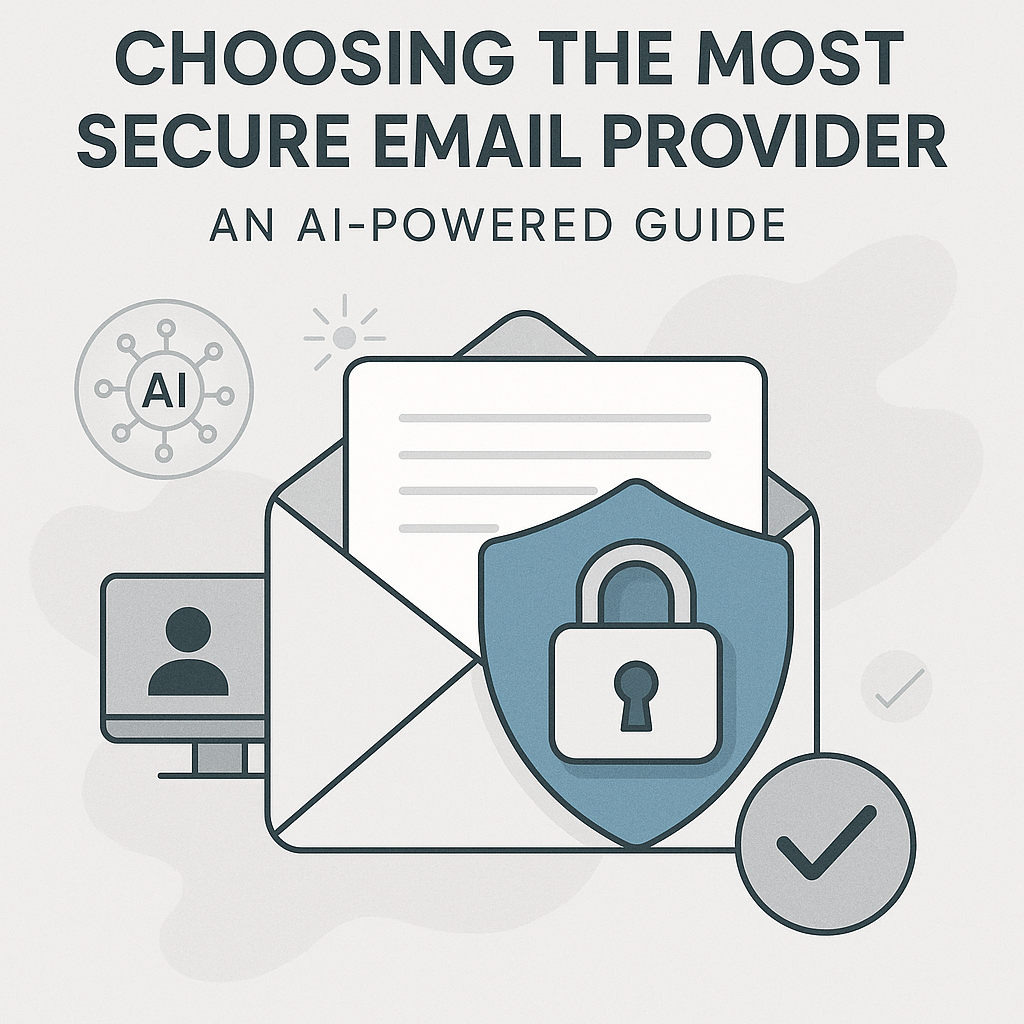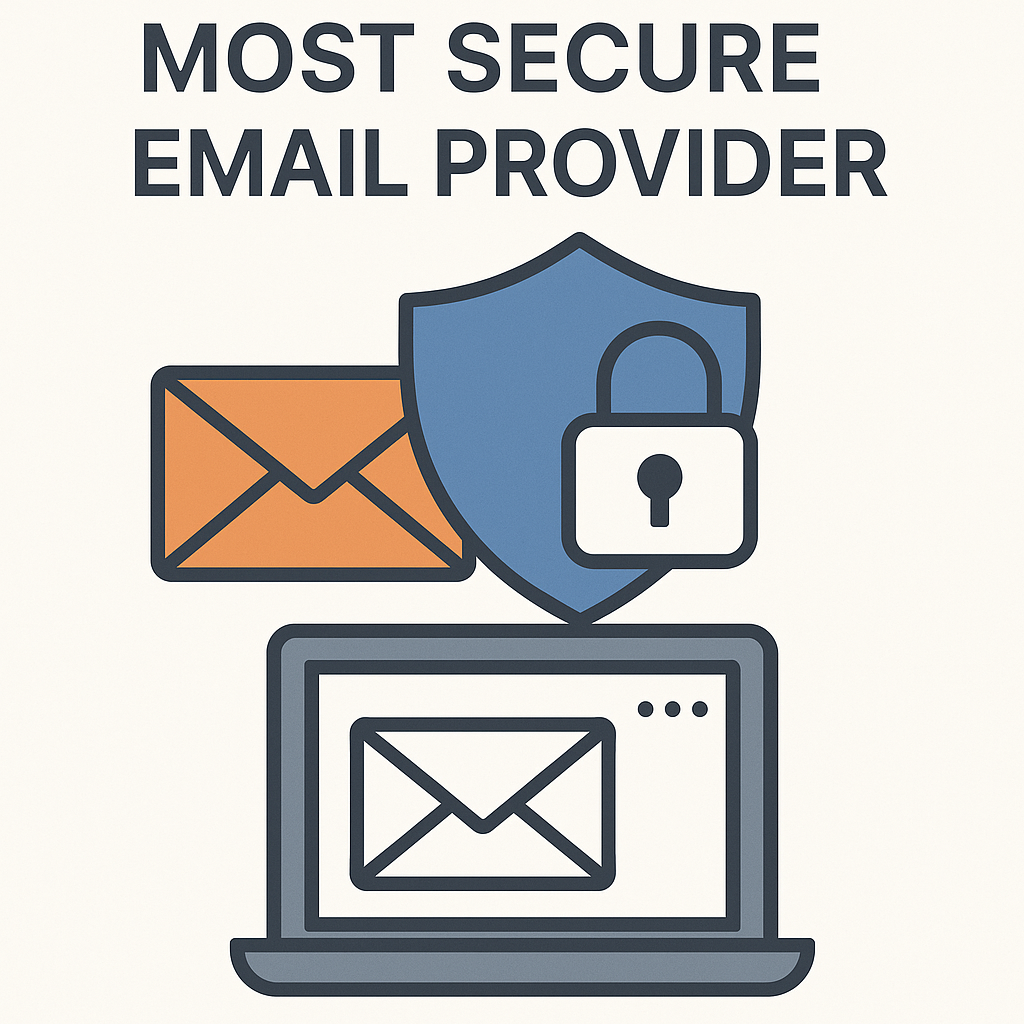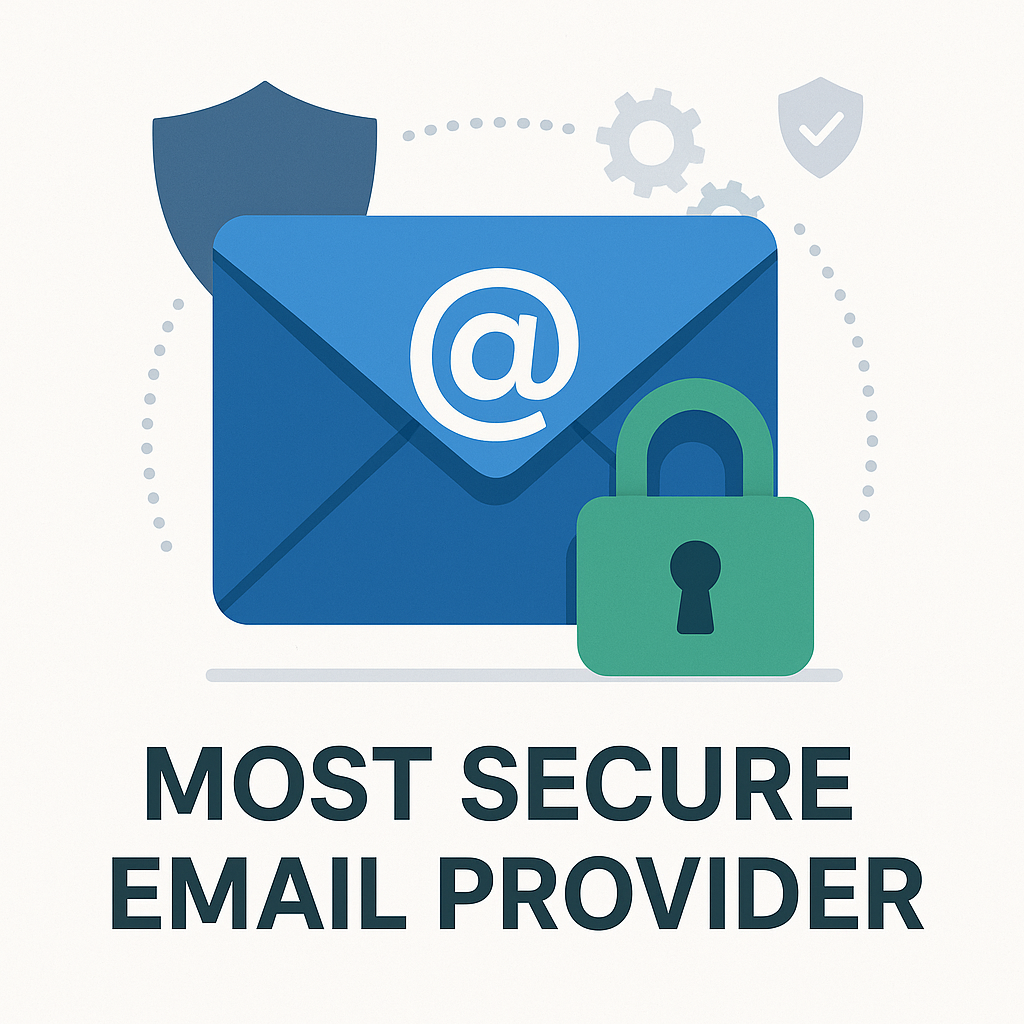Choosing the Most Secure Email Provider: An AI-Powered Guide

Why Email Security is Paramount for Business Professionals and Data Protection
The digital threat landscape is constantly evolving, making robust email security a critical component of any comprehensive business strategy. For business professionals, the risks associated with insecure email extend far beyond a simple inconvenience.The Escalating Threat Landscape
- Phishing and Spear Phishing: These remain the most prevalent attack vectors. Cybercriminals craft convincing emails designed to trick employees into revealing credentials, transferring funds, or downloading malware. According to the FBI's 2023 Internet Crime Report, phishing was the most common type of cybercrime, accounting for the highest number of victim complaints.
- Ransomware and Malware: Email is a primary delivery mechanism for ransomware, which can encrypt an entire company's data until a ransom is paid, and other forms of malware that compromise systems.
- Business Email Compromise (BEC): Often dubbed "CEO fraud," BEC attacks involve impersonating executives or trusted partners to trick employees into making fraudulent payments or divulging sensitive information. These attacks are notoriously difficult to detect without advanced security measures.
- Data Breaches: An insecure email system can be a direct conduit for data exfiltration, leading to the exposure of confidential customer information, trade secrets, and financial data. The average cost of a data breach continues to rise, making prevention paramount.
Protecting Your Reputation and Bottom Line
Beyond the immediate financial losses, a data breach stemming from insecure email can inflict lasting damage on a company's reputation. Customers lose trust, partners become wary, and the brand image can suffer irreparable harm. Compliance with data privacy regulations like GDPR, CCPA, and HIPAA also mandates stringent data protection measures, with non-compliance leading to hefty fines.
Implementing email security best practices is not just about avoiding penalties; it's about maintaining operational integrity and fostering a secure environment where your teams can focus on productivity without constant fear of cyber threats.
Core Features That Define the Most Secure Email Provider
When evaluating secure business email solutions, it's crucial to look beyond basic encryption. A truly secure email provider offers a multi-layered defense system.1. End-to-End Encryption (E2EE)
This is the cornerstone of secure email. E2EE ensures that only the sender and the intended recipient can read the message. The data is encrypted on the sender's device and remains encrypted until it reaches the recipient's device. Not even the email provider can access the content. Technologies like PGP (Pretty Good Privacy) or S/MIME (Secure/Multipurpose Internet Mail Extensions) are often used. Providers like Proton Mail and Tutanota are renowned for their robust E2EE implementations, making them top contenders for the most secure email provider title.
2. Multi-Factor Authentication (MFA/2FA)
MFA adds an essential layer of security by requiring more than just a password to log in. This could be a code from an authenticator app, a fingerprint scan, or a hardware security key. Even if a cybercriminal steals your password, they cannot access your account without the second factor.
3. Zero-Knowledge Architecture
A zero-knowledge system means the provider has no access to your encryption keys, and thus, cannot decrypt your emails or data. This is a critical privacy feature, as it ensures that even under legal compulsion, the provider cannot hand over your unencrypted data to third parties.
4. Strict Privacy Policies and Jurisdiction
The location of a provider's servers and its operating jurisdiction significantly impact your data's privacy. Countries with strong privacy laws (e.g., Switzerland for Proton Mail, Germany for Tutanota) offer better protection against government surveillance or data requests. Look for providers with clear no-logging policies, meaning they do not store metadata or IP addresses that could identify users.
5. Advanced Spam & Malware Filters
While often overlooked, robust spam and malware filtering are your first line of defense. These systems should not only catch obvious spam but also detect sophisticated phishing attempts, malicious attachments, and suspicious links before they reach your inbox.
6. Secure File Sharing and Cloud Storage
Many secure email providers integrate encrypted file sharing or cloud storage solutions, ensuring that attachments and shared documents are protected with the same level of security as your emails.
7. Open-Source Code
Providers that make their code open-source allow independent security experts to audit it for vulnerabilities. This transparency fosters trust and helps identify and patch potential weaknesses quickly, contributing to stronger email security services.
The Game-Changing Role of AI in Advanced Email Security and Threat Detection
While the core features listed above are foundational, Artificial Intelligence is rapidly transforming the landscape of email security, moving it from reactive to proactive. AI-powered email protection is no longer a futuristic concept; it's a present-day necessity for combating increasingly sophisticated threats.AI's Capabilities in Email Security:
- Sophisticated Phishing Detection: Traditional filters often rely on blacklists or signature-based detection. AI, however, can analyze subtle linguistic patterns, sender behavior anomalies, URL structures, and even emotional cues within an email to identify highly targeted spear phishing, whaling, and business email compromise (BEC) attempts that would bypass conventional defenses. It learns from vast datasets of legitimate and malicious emails to discern even the most cunning impersonations.
- Predictive Threat Intelligence: AI algorithms can analyze global threat data, identify emerging attack patterns, and predict potential future threats. This allows email security solutions to adapt in real-time, protecting against zero-day exploits and novel malware variants before they become widespread.
- Automated Incident Response: When a threat is detected, AI can automate response actions, such as quarantining suspicious emails, blocking malicious URLs, or even initiating user alerts, significantly reducing the time to neutralize a threat. This is where an ai executive assistant can play a pivotal role, automating security responses and streamlining incident management.
- Data Loss Prevention (DLP): AI can monitor outgoing emails for sensitive information (e.g., credit card numbers, confidential documents, personal data) and prevent accidental or malicious data leaks by flagging, encrypting, or blocking emails that violate company policies.
- User Behavior Analytics: AI can establish a baseline of normal user behavior and flag unusual activities, such as an employee attempting to access an account from an unfamiliar location or downloading an unusually large volume of data, indicating a potential compromise.
The integration of AI transforms email security from a static defense into a dynamic, intelligent shield. It significantly enhances the ability of hosting business email providers to protect against advanced persistent threats, ensuring that your communications remain secure and your operations unhindered.
Choosing Your Secure Email Provider: Key Considerations Beyond Basic Encryption
While security features are paramount, a holistic approach to selecting the most secure email provider for your business also requires evaluating practical considerations that impact usability, integration, and long-term viability.1. Reputation and Track Record
Research the provider's history. Have they experienced data breaches? How do they respond to security vulnerabilities? Look for transparency in their security practices and a commitment to continuous improvement. Providers like Proton Mail, Tutanota, and Mailfence have established strong reputations in the secure email space.
2. Ease of Use and User Experience
Even the most secure system is useless if it's too complicated for your team to use. A good secure email provider should offer an intuitive interface, easy setup, and seamless integration with existing business workflows. Consider web interfaces, desktop clients, and mobile apps. Complexity can lead to security gaps as users seek workarounds.
3. Scalability for Business Growth
As your business expands, your email needs will grow. Ensure the provider can scale with you, offering additional users, storage, and features without compromising security or performance. Look for flexible plans that can accommodate your evolving requirements, from a small startup to an enterprise-level organization.
4. Customer Support and Resources
Even with the most robust systems, issues can arise. Evaluate the quality of customer support. Do they offer 24/7 assistance? Are there comprehensive knowledge bases, tutorials, and community forums available? Responsive and knowledgeable support is crucial for minimizing downtime and resolving security concerns swiftly.
5. Cost-Effectiveness and Value
While security is paramount, it also needs to be financially viable. Compare pricing models (per user, per feature) across different providers. Consider the total cost of ownership, including setup, maintenance, and potential add-ons. Remember that investing in a secure provider is an investment in preventing potentially far more costly data breaches.
6. Integration with Other Business Tools
Does the email provider integrate well with your existing CRM, calendar, document management systems, or other productivity tools? Seamless integration can significantly enhance workflow efficiency without compromising security. For instance, some providers offer secure calendar or cloud storage solutions built into their ecosystem.
7. Specific Industry Compliance Requirements
Depending on your industry (e.g., healthcare, finance, legal), you may have specific regulatory compliance requirements (HIPAA, FINRA, etc.). Ensure the chosen provider explicitly states their compliance with relevant standards and offers features like audit logs or data retention policies that meet these needs.
Integrating Security with Productivity: The Future of Email Management
For far too long, security and productivity have been seen as opposing forces. The perception was that enhanced security inevitably meant more friction, more steps, and ultimately, less efficiency. However, the future of email management lies in seamlessly integrating robust security measures with features that boost productivity, creating a secure yet streamlined workflow.How Secure Email Enhances Productivity:
- Reduced Disruptions: By proactively preventing phishing attacks, malware infections, and data breaches, secure email significantly reduces the time and resources spent on incident response, recovery, and damage control. Your team can focus on their core tasks rather than being sidetracked by security alerts or system downtime.
- Streamlined Compliance: For businesses operating under strict data privacy regulations, a secure email provider simplifies compliance efforts. Automated encryption, data retention policies, and audit trails mean less manual effort and a reduced risk of non-compliance fines, freeing up valuable time.
- Confidential Communication: Knowing that sensitive communications are protected by end-to-end encryption fosters confidence among employees, clients, and partners. This enables more open and efficient discussion of confidential matters without resorting to less convenient, insecure communication channels.
- AI-Powered Efficiency Tools: Many leading secure email providers are integrating AI not just for security, but also for productivity features. Think of intelligent inbox management, automated sorting, smart replies, and even task prioritization. Tools like an AI automation platform can work hand-in-hand with secure email to manage your communications more effectively. Furthermore, exploring how personal AI for email or simple AI for email can transform your inbox into a highly efficient workspace is key to modern email management.
The goal is to choose an email security solution that acts as an enabler, not a hindrance. By selecting a provider that balances strong security with intuitive features and AI-driven enhancements, businesses can achieve unparalleled levels of both protection and efficiency. This holistic approach ensures that your email system is not just a communication tool, but a secure, productive hub for your entire business operation.
Conclusion: Building a Secure and Efficient Email Foundation for Your Business
In an era where digital threats loom larger than ever, choosing the most secure email provider is no longer a luxury but a fundamental requirement for business survival and success. The integrity of your communications, the privacy of your data, and the trust of your clients all hinge on the strength of your email security foundation. We've explored the critical features that define a truly secure service, from robust end-to-end encryption and multi-factor authentication to zero-knowledge architecture and stringent privacy policies. Crucially, we've highlighted the transformative power of Artificial Intelligence in bolstering email security, enabling advanced threat detection, proactive defense, and automated incident response against even the most sophisticated cyberattacks. For business professionals, entrepreneurs, sales and marketing teams, remote workers, and enterprise IT, the journey to a secure inbox involves a careful evaluation of a provider's reputation, ease of use, scalability, and integration capabilities. By prioritizing these elements, you can select a solution that not only protects your sensitive information but also enhances your overall productivity by minimizing security-related disruptions. Don't wait until a breach occurs to prioritize your email security. Take proactive steps today to evaluate your current setup and consider upgrading to a provider that offers the highest standards of protection. Investing in a truly secure email provider is an investment in your business's future, ensuring peace of mind, operational continuity, and sustained growth in an increasingly digital world. Make an informed decision, and safeguard your most valuable digital assets.


